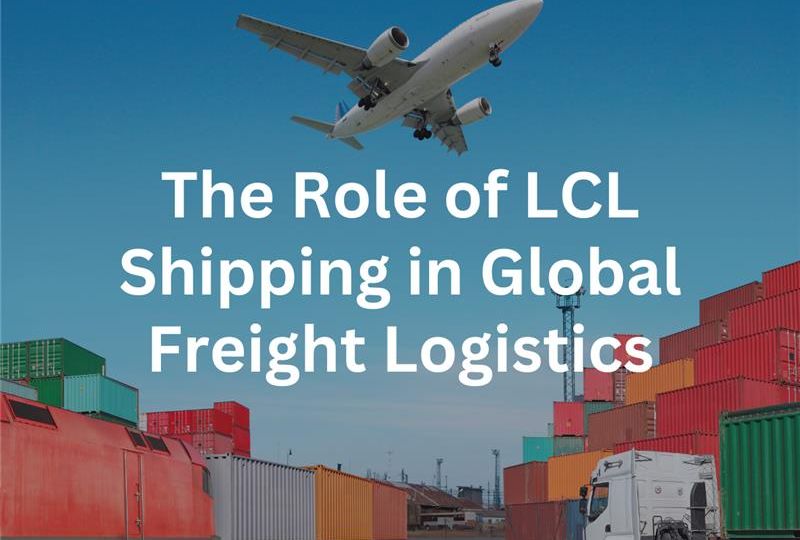
Global trade is no longer limited to large corporations. Today, small and medium-sized enterprises ship products worldwide and don’t always need a full container. Less-than-Container Load (LCL) makes that possible. This cargo shipping allows companies to send smaller shipments without waiting or paying for space they don’t use. It’s flexible, efficient, and perfect for businesses. Whether launching a new product, testing a new region, or not having a full container’s worth of goods, it might be your most brilliant shipping move yet.
In this blog, we’ll dive into LCL, why it’s growing in popularity, its advantages and challenges, and how it fits into the broader global logistics picture.
What Is LCL Shipping?
LCL stands for Less-than-Container Load, a shipping method where multiple shippers share space within a single container. It lets companies pay only for the space they use instead of waiting to fill an entire 20- or 40-foot container.
A freight forwarder or logistics company combines goods from different businesses into one container. Once the container arrives at its destination, it is unloaded, and each shipment is delivered to the correct person or company. It’s an efficient way to move goods, especially when delivering small or medium volumes, while keeping costs in check.
Why LCL Shipping Is Gaining Ground?
It has become increasingly important with e-commerce, globalization, and growing international supply chains. Here’s why:
- Smaller businesses are entering the global market.
- Companies want to reduce warehouse costs and ship more frequently.
- Supply chains need to stay agile in an unpredictable market.
- LCL offers a more affordable option for testing new markets or suppliers.
It provides accessibility, affordability, and flexibility, making it an essential option for businesses in virtually every industry.
Key Benefits of LCL Shipping
- Cost Efficiency
You’re charged based on the amount of space your goods take up. This makes it far more affordable than booking a full container if you don’t need one. It reduces upfront shipping costs, especially for smaller or irregular shipments.
- Improved Cash Flow
Instead of holding inventory until there is enough to fill a full container, LCL allows for more frequent, smaller cargo. This supports just-in-time inventory strategies and helps businesses keep cash flowing rather than being tied up in large bulk orders.
- Faster Market Response
It enables businesses to quickly adapt to shifting customer demand. Whether restocking a best-seller or testing new products in a different region, you can ship smaller loads without delay.
- Greater Global Access
It makes international shipping more accessible for startups, small businesses, and growing companies. It opens the door to overseas markets, even when you don’t have high-volume freight.
- Lower Warehousing Costs
Regular, smaller shipments help avoid storing large amounts of inventory. It leads to cutting down on storage space, inventory holding costs, and overstock risk.
- Environmentally Friendly
Maximizing container space reduces the number of containers needed. This decreases fuel consumption and carbon emissions. It’s a more sustainable option that supports greener logistics.
How LCL Fits into Global Freight Logistics?
It integrates smoothly with other shipping modes and freight strategies in several ways:
1. Multimodal Integration
LCL containers travel by sea, truck, rail, or air as part of a multimodal network. This connection keeps goods moving efficiently across borders and through varied terrains.
2. Enhanced Agility
It helps businesses adapt faster to change in an age of supply chain disruptions. Companies can ship smaller volumes to test new suppliers, shift inventory to different regions, or avoid the risks of overstocking during uncertain demand.
3. Global Expansion for SMBs
LCL removes the high cost barrier to international shipping. It makes global expansion more realistic for small and medium businesses. These businesses can build global partnerships, sell internationally, and manage risk without heavy investment.
4. Inventory Optimization
It supports lean inventory practices by enabling just-in-time shipping. This helps companies lower holding costs and improve warehouse turnover.
Common Challenges of LCL Shipping
Like any shipping method, LCL has its limitations.
1. Slightly Longer Transit Times
Consolidation and deconsolidation often take longer for these shipments than for FCL. Planning and working with experienced providers can help manage expectations and schedules.
2. Higher Handling Risks
With more parties involved and more handling points, there’s a slightly increased risk of damage or misplacement. Proper packaging, labeling, and choosing a reliable freight forwarder help minimize this.
3. More Complex Documentation
Each LCL shipment in a shared container has its own paperwork and requirements. It complicates customs clearance. An experienced logistics partner can manage this process and ensure compliance.
When Is LCL the Right Choice?
It is ideal for situations like:
- Delivering small or medium-sized loads internationally
- Testing new markets or suppliers
- Managing overflow inventory or split shipments
- Needing cost-effective shipping without full container volume
- Supporting frequent, lower-volume deliveries
Even big companies turn to LCL for urgent restocking, launching new products, or sending goods to specific regions.
The Benefits of Maximizing LCL
To make the most of it, keep these tips in mind:
- Use proper packaging: Ensure your goods are well-protected for consolidation, loading, and unloading.
- Label shipments clearly: Proper labeling prevents confusion during deconsolidation.
- Partner with a trusted forwarder: Experienced logistics companies handle consolidation efficiently and help you manage documentation and customs.
- Plan for lead times: It is affordable but may take longer, so plan your delivery timeline accordingly.
- Track cargo actively: Use technology tools or partner platforms to stay updated on your cargo.
Your Competitive Edge Starts with Smarter Shipping!
LCL shipping is at the center of global logistics transformation. It gives businesses the ability to ship smarter. It delivers real advantages to cut costs, reach new markets, or build a more agile supply chain. From startups to industry leaders, businesses that embrace this shipping are positioning themselves for smarter, more scalable growth.
Optimizing your supply chain with LCL can give you the agility to respond to market demands quickly and efficiently. That’s where Faith Logistics, a trusted shipping company in Singapore, comes in. With deep industry expertise, a global network, and a commitment to tailored logistics solutions, we ensure your cargo moves smoothly, securely, and on time.
Ready to streamline your international shipping? Partner with Faith Logistics today and deliver smarter across borders!

